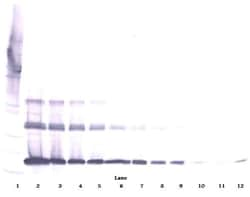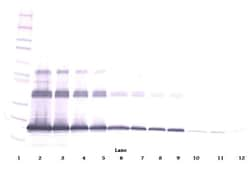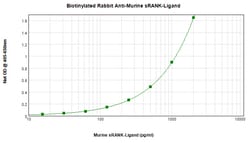Learn More
Invitrogen™ RANKL (soluble) Polyclonal Antibody, Biotin, PeproTech®, Invitrogen™
Rabbit Polyclonal Antibody
Supplier: Invitrogen™ 500P63BT500UG

Description
AA Sequence of recombinant protein: PAMMEGSWLD VAQRGKPEAQ PFAHLTINAA SIPSGSHKVT LSSWYHDRGW AKISNMTLSN GKLRVNQDGF YYLYANICFR HHETSGSVPT DYLQLMVYVV KTSIKIPSSH NLMKGGSTKN WSGNSEFHFY SINVGGFFKL RAGEEISIQV SNPSLLDPDQ DATYFGAFKV QDID. Preparation: Produced from sera of rabbits immunized with highly pure Recombinant Murine sRANK Ligand. Anti-Murine sRANK Ligand-specific antibody was purified by affinity chromatography and then biotinylated. Sandwich ELISA: To detect msRANKL by sandwich ELISA (using 100 μL/well antibody solution) a concentration of 0.25-1.0 μg/mL of this antibody is required. This biotinylated polyclonal antibody, in conjunction with PeproTech Polyclonal Anti-Murine sRANKL (500-P63) as a capture antibody, allows the detection of at least 0.2-0.4 ng/well of Recombinant msRANKL. Western Blot: To detect msRANKL by Western Blot analysis this antibody can be used at a concentration of 0.1-0.2 mg/mL. Used in conjunction with compatible secondary reagents the detection limit for Recombinant msRANKL is 1.5-3.0 ng/lane, under either reducing or non-reducing conditions. 500-P63BT-1MG will be provided as 2 x 500 μg
This gene encodes a member of the tumor necrosis factor (TNF) cytokine family which is a ligand for osteoprotegerin and functions as a key factor for osteoclast differentiation and activation. This protein was shown to be a dentritic cell survival factor and is involved in the regulation of T cell-dependent immune response. T cell activation was reported to induce expression of this gene and lead to an increase of osteoclastogenesis and bone loss. This protein was shown to activate antiapoptotic kinase AKT/PKB through a signaling complex involving SRC kinase and tumor necrosis factor receptor-associated factor (TRAF) 6, which indicated this protein may have a role in the regulation of cell apoptosis. Targeted disruption of the related gene in mice led to severe osteopetrosis and a lack of osteoclasts. The deficient mice exhibited defects in early differentiation of T and B lymphocytes, and failed to form lobulo-alveolar mammary structures during pregnancy. Two alternatively spliced transcript variants have been found.
Specifications
| RANKL (soluble) | |
| Polyclonal | |
| Biotin | |
| TNFSF11 | |
| CD254; H-RANK-L; hRANKL2; Ly109l; M-Rank-L; ODF; OPG; OPG ligand; OPGL; OPTB2; Osteoclast differentiation factor; osteoprotegerin ligand; Rankl; rank-l; receptor activator of NF-kappaB ligand; receptor activator of nuclear factor kappa B ligand; receptor activator of nuclear factor kappa-B ligand; RP11-86N24.2; sOdf; srankl; TNF-related activation-induced cytokine; Tnfsf11; TNLG6B; Trance; tumor necrosis factor (ligand) superfamily member 11; tumor necrosis factor (ligand) superfamily, member 11; tumor necrosis factor ligand 6B; tumor necrosis factor ligand superfamily member 11; Tumor necrosis factor ligand superfamily member 11, membrane form; Tumor necrosis factor ligand superfamily member 11, soluble form; tumor necrosis factor superfamily member 11; tumor necrosis factor-related activation-induced cytokine | |
| Rabbit | |
| Antigen affinity chromatography | |
| RUO | |
| 21943 | |
| -20°C | |
| Lyophilized |
| ELISA, Western Blot | |
| 0.1-1.0 mg/mL | |
| PBS with no preservative | |
| O35235 | |
| TNFSF11 | |
| E.coli-derived, 19.4 kDa Recombinant Murine sRANK Ligand. | |
| 500 μg | |
| Primary | |
| Mouse | |
| Antibody | |
| IgG |
The Fisher Scientific Encompass Program offers items which are not part of our distribution portfolio. These products typically do not have pictures or detailed descriptions. However, we are committed to improving your shopping experience. Please use the form below to provide feedback related to the content on this product.


